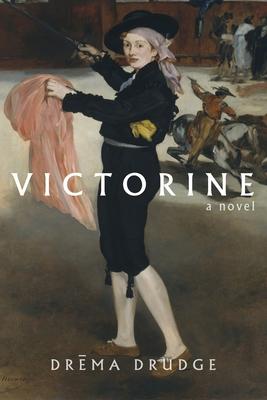In 1863, civil war is raging in the United States. Victorine Meurent is posing nude, in Paris, for paintings that will be heralded as the beginning of modern art: Manet's Olympia and Picnic on the Grass. However, Victorine's persistent desire is not to be a model but to be a painter herself. In order to live authentically, she finds the strength to flout the
expectations of her parents, bourgeois society, and the dominant male artists (whom she knows personally) while
never losing her capacity for affection, kindness, and loyalty. Possessing both the incisive mind of a critic and the
intuitive and unconventional impulses of an artist, Victorine and her survival instincts are tested in 1870, when the Prussian army lays siege to Paris and rat becomes a culinary delicacy. Drēma Drudge's powerful first novel Victorine not only gives this determined and gifted artist back to us but also recreates an era of important transition into the modern world.

In 1863, civil war is raging in the United States. Victorine Meurent is posing nude, in Paris, for paintings that will be heralded as the beginning of modern art: Manet's Olympia and Picnic on the Grass. However, Victorine's persistent desire is not to be a model but to be a painter herself. In order to live authentically, she finds the strength to flout the
expectations of her parents, bourgeois society, and the dominant male artists (whom she knows personally) while
never losing her capacity for affection, kindness, and loyalty. Possessing both the incisive mind of a critic and the
intuitive and unconventional impulses of an artist, Victorine and her survival instincts are tested in 1870, when the Prussian army lays siege to Paris and rat becomes a culinary delicacy. Drēma Drudge's powerful first novel Victorine not only gives this determined and gifted artist back to us but also recreates an era of important transition into the modern world.